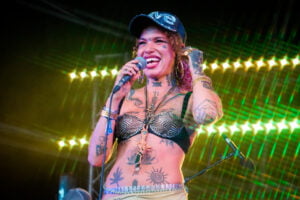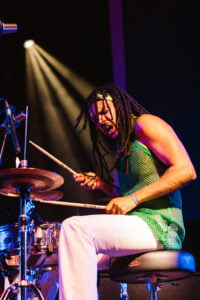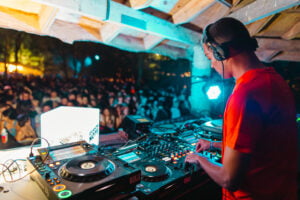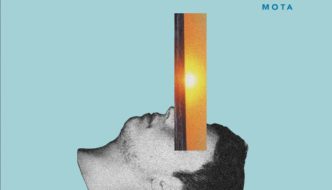
Main Stage @ We Out Here festival. Credit: Rob Jones for Khroma Collective
For music festivals, the end of the COVID-19 pandemic could not come soon enough. As our chats with leading industry figures have revealed, being at the back of the queue to leave lockdown created 16 months of self-doubt for those working in events. With more vaccines and fewer restrictions, it’s still been unclear what future has awaited many festivals, if any at all.
Despite proving their safety through testing schemes, it was only a few weeks ago that insurance had been guaranteed for festivals that were cancelled due to COVID. For many, this has meant another year of postponement.
But if giants like Glastonbury fall, or trailblazers like Boomtown can be abandoned, the British festival landscape starts to look different. Being one of the few summer festivals standing, in a country with such a big weekender culture, becomes an opportunity.
And so it falls to We Out Here, the jazz-focused, Gilles Peterson-curated, ten-thousand cap. event to deliver one of the rare post lockdown raves available, in just its second year.

Main Stage @ We Out Here. Credit: Jamie Crumpton
We Out Here specialise in music sat just outside the mainstream, but with immense scope and accessibility. Live acts are mainly from jazz, soul and R&B backgrounds across the globe, whilst the DJs making up the line-up’s other half play drum’n’bass, techno, dub and leftfield dance.
Across four days, the worldly web of styles on display at this festival, and the talents that are tackling them, is staggering.
The rich variety of British R&B is well represented, with Ego Ella May and Yazmin Lacey sublimely supplying its smoother side; Greentea Peng’s complex, gorgeous compositions embody the weird greatness of London neo-soul.

Greentea Peng @ We Out Here. Credit: Ella Brolly
The nation’s jazz stars stud the Main Stage. From Emma-Jean Thackray to Ashley Henry, from Mercury-nominees Nubya Garcia to Moses Boyd, their music has matured in a way that embodies London’s jazz scene itself, growing from a hip-hop-influenced take on jazz to become the defining style of the genre today.
Yussef Dayes’ UKG-meets-Billy Cobham drumming is the summit of this contemporary musical moment. Even bringing on Tom Misch can’t draw attention away from Dayes’ insane drum-playing: it ties all the elements on stage together, yet drives them forward like a frontman rather than a time-keeper. He encapsulates the festival spirit, making everyone dance and displaying as much talent as possible in the process.

Yussef Dayes @ We Out Here. Credit: Rob Jones for Khroma Collective.
Ultimately, he sets a bar that doesn’t get beaten. Not even Thundercat, who fills the special guest slot, can usurp him with his crazy hybrid of fun and virtuosity.
The DJ half of the line up celebrates plenty of newcomers, as well as those that pushed the art form forward for years. National icons like Fabio & Grooverider, Luke Unabomber and Wookie do the right thing by raking through classics in their sets, from Benga’s ‘Night’ to Roy Davis Jnr.’s ‘Gabriel’. They unashamedly acknowledge the party tunes that made the UK a global clubbing leader and helped carve the way for a festival like We Out Here to exist.

The Woodlands Stage @ We Out Here. Credit: Rob Jones for Khroma Collective.
Gilles Peterson opens the main stage on Friday with a perfect display of how a DJ can save lives. The many listeners lying down in recovery states at the start, having made the mistake of going too hard on the first night, are lulled out of their hangovers once Idris Muhammed’s ‘Can Heaven Ever Be Like This’ comes on.
Two DJs in their prime stand out. Batu refuses to settle in one sound for more than several minutes. The speedy yet subtle changes are immensely rewarding for a crowd in The Forest hanging on every blend.

Batu @ We Out Here. Credit: Rob Jones for Khroma Collective.
Call Super ends his 3 hours with a drum and bass rework of ‘No Diggity’, creating one of those moments that no one wants to leave. Many track selections this weekend say something similar: that sometimes you don’t need to come armed with hours of the obscure, just something fucking fun.
But it’s Sherelle that excels most. With a romantic commitment to anything 160 bpm and up, her set is a true ankle-breaker, and showcases her rightful claim to being the best DJ in the country right now.

Call Super @ We Out Here. Credit: Rob Jones for Khroma Collective
Overall the festival has scaled up excellently. Increasing the crowd, stages and acts has done nothing to impact its high standards. It’s a beautiful site with a unique sound that has some strange, infinite fulfilment going on: it feeds off a growing audience, who are in demand of something different to what your standard festival offers; at the same time it helps that very audience to grow, giving them more names to discover and more incentive to expand their tastes.
And you can’t ignore the context behind We Out Here’s achievements.
As Gilles Peterson says in his summative speech, just before Sons of Kemet tear the main stage up, the upset and uncertainty that have built up to this weekend have been easy to forget. But the fact they’ve been easy to forget is all down to We Out Here’s organisers and its artists, and the reason it’s been such a success.
In just four days they’ve swept away a year and a half of virus-induced anxiety – they’ve reassured us that our artists and culture are not at risk, but thriving more than ever – they’ve shown us that after all this time, we still remember how to dance.
Filed under: Music
Tagged with: British jazz, British music, clubbing, covid-19, DJ, events, hip-hop, jazz, Live Music, lockdown, London jazz, music festival, nightlife, performance, r&b, Soul, uk jazz, we out here, we out here 2021, we out here festival



Comments